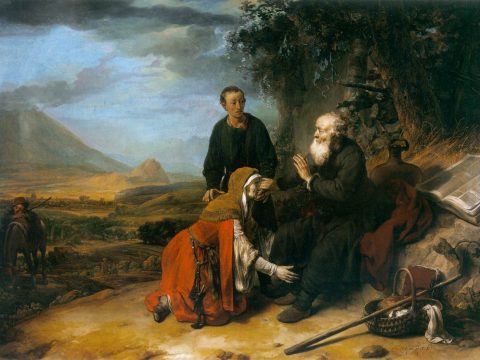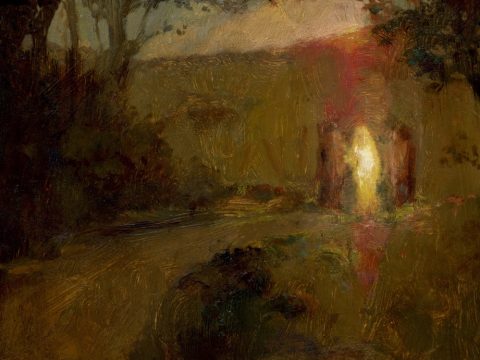
Brethren, give diligence to make your calling and election sure.
2 Peter 1:10
Not purloining, but shewing all good fidelity; that they may adorn the doctrine of God our Saviour in all things.
Titus 2:10
It is “the diligent soul,” and not the dilatory, who “shall be made fat”.
Prov 13:4
Only thus do we give proof of our regeneration. “Herein is my Father glorified, that ye bear much fruit: so shall ye be my disciples” (John 15:8).
That does not mean we become the disciples of Christ as a result of our fruitfulness, but that we make manifest we are His by our fruitbearing. They who bear no fruit have no vital union with Christ, and like the barren fig tree, are under His curse. Very solemn is this, and by such a criterion each of us should measure himself. That which is brought forth by the Christian is not to be restricted unto what, in many circles, is called “service” or “personal work,” but has reference to that which issues from the exercise of all the spiritual graces. Thus: “Love your enemies, bless them that curse you, do good to them that hate you and pray for them which despitefully use you and persecute you; that ye may be the children of your Father which is in heaven” (Matthew 5:44, 45), that is, that you may make it evident to yourself and fellows that you have been made “partaker of the Divine nature.”
“Now the works of the flesh are manifest, which are these,” etc., “but the fruit of the Spirit is love, joy, peace, longsuffering, gentleness, goodness, faith, meekness, temperance” (Gal. 5:19, 22, 23). The reference is not directly to what the Holy Spirit produces, but rather to that which is born of the “spirit” or new nature of which He is the Author (John 5:6). This is evident from its being set over against the “works of the flesh” or old nature. It is by means of this “fruit,” these lovely graces. that the regenerate make manifest the presence of a supernatural principle within them. The more such “fruit” abounds, the clearer our evidence that we have been born again. The total absence of such fruit would prove our profession to be an empty one. It has often been pointed out by others that what issues from the flesh is designated works,” for a machine can produce such; but that which the “spirit” yields is living “fruit” in contrast from “dead works” (Heb. 6:1; 9:14). This fruit-bearing is necessary in order to evidence the new birth.
Only thus do we certify that we have been made partakers of an effectual call and are among the chosen of God. “Brethren, give diligence to make your calling and election sure” (2 Peter 1:10) is the Divine exhortation—one which has puzzled many. Yet it should not: it is not to secure it Godward (which is impossible), but to make it more certain to yourselves and your brethren. And how is this to be accomplished? Why, by acquiring a clearer and fuller evidence of the same: by spiritual growth, for growth is proof that life is present. This interpretation is definitely established by the context. After enumerating the bestowments of Divine grace (vv. 3, 4) the apostle says, now here is your responsibility: “And besides this, giving all diligence, add to your faith [by bringing it into exercise] virtue; and to virtue knowledge; and to knowledge temperance; and to temperance patience; and to patience godliness; and to godliness brotherly kindness; and to brotherly kindness love” (vv. 5-7). Faith itself is ever to be operative, but according to different occasions and in their seasons let each of your graces be exercised, and in proportion as they are, the life of holiness is furthered in the soul and there is a proportionate spiritual growth (cf. Col. 3:12, 13).
Only thus do we adorn the doctrine we profess (Titus 2:10). The Truth we claim to have received into our hearts is “the doctrine which is according to godliness” (1 Tim. 6:3), and therefore the more our daily lives be conformed thereto the clearer proof do we give that our character and conduct is regulated by heavenly principles. It is by our fruits we are known (Matthew 7:16), for “every good tree bringeth forth good fruit.” Thus, it is only by our being “fruitful in every good work” (Col, 1:10) that we make it manifest that we are the “trees of the Lord” (Ps. 104:16). “Now are ye light in the Lord, walk as children of light” (Eph. 5:8). It is not the character of our walk which qualifies us to become the children of light, but which demonstrates that we are such. Because we are children of Him who is light (1 John 1:5) we must shun the darkness. If we have been “sanctified in Christ Jesus” (1 Cor. 1:2) then only that should proceed from us which “becometh saints” (Eph. 5:3). The more we progress in godliness the more we adorn our profession.
Only thus do we experience more genuine assurance. Peace becomes more stable and joy abounds in proportion as we grow in grace and in the knowledge of our Lord and Saviour Jesus Christ, and become more conformed practically to His holy image. It is because so many become slack in using the means of grace and are so little exercised about growing up into Christ “in all things” (Eph. 4:16) that doubts and fears possess their hearts. If they do not “give all diligence to add to their faith” (2 Peter 1:5) by cultivating their several graces, they must not be surprised if they are far from being “sure” of their Divine calling and election. It is “the diligent soul,” and not the dilatory, who “shall be made fat” (Prov. 13:4).
It is the one who makes conscience of obedience and keeps Christ’s commandments who is favored with love-tokens from Him (John 14:21). There is an inseparable connection between our being “led [forward] by the Spirit of God”—which intimates our voluntary occurrence—and His “bearing witness with our spirit” (Rom. 8:14, 16).
Only thus are we preserved from grievous backsliding. In view of much that has been said above this should be quite obvious. The very term “backsliding” denotes failure to make progress and go forward. Peter’s denial of Christ in the high priest’s palace was preceded by his following Him “afar off” (Matthew 26:58), and that has been recorded for our learning and warning. The same principle is illustrated again in connection with the awful fall of David. Though it was “at the time when kings go forth to battle” he was selfishly and lazily taking his ease, and while so lax succumbed to temptation (1 Sam. 11:1, 2). Unless we “follow on to know the Lord” and learn to make use of the armor which He has provided, we shall easily be overcome by the Enemy. Only as our hearts are kept healthy and our affection set upon things above shall we be impervious to the attractions of this world. We cannot be stationary: if we do not grow, we shall decline.
Only thus shall we preserve the cause of Christ from reproach. The backsliding of His people makes His enemies to blaspheme—how many have taken occasion to do so from the sad case of David! When the world sees us halting, it is gratified, being bolstered up in their idea that godliness is but a pose, a sham. Because of this, among other reasons, Christians are bidden to “be blameless and harmless, the sons of God, without rebuke in the midst of a crooked and perverse nation, among whom shine ye as lights in the world” (Phil. 2:15). If we go backward instead of forward—and we must do one or the other—then we greatly dishonor the name of Christ and fill His foes with unholy glee. Rather is it “the will of God that with well-doing we put to silence the ignorance of foolish men” (1 Peter 2:15). The longer they remain in this world, the more apparent should be the contrast between the children of light and those who are the subjects of the Prince of darkness. Very necessary then, from many considerations, is our growth in grace.
A.W. Pink. Spiritual Growth.
Notes:
Fruits are not restricted to physical “service”, religious duties, “personal work” but rather, ALL spiritual service:
Love your enemies,
bless them that curse you,
do good to them that hate you,
pray for them which despitefully use you and persecute you;
Also, the Fruit of the Spirit: love, joy, peace, longsuffering, gentleness, goodness, faith, meekness, temperance.
These are not the cause of regeneration or salvation, but “because of” these, the clearer our evidence that we have been born again.



